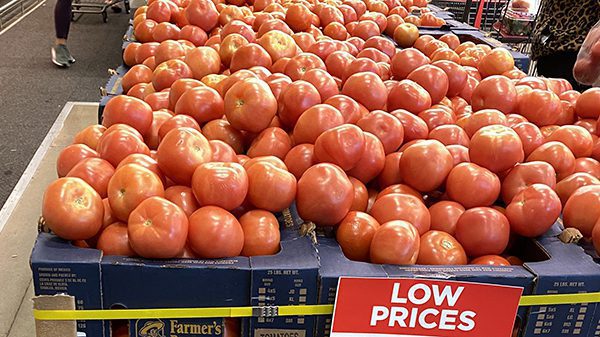By allowing this labeling flexibility, food can be diverted from restaurants to retail, ensuring that this food is made available to families around the country and helping restaurants and their suppliers access additional markets, such as grocery stores, that are currently experiencing greater demand.
The U.S. Department of Agriculture (USDA) Agricultural Marketing Service (AMS) is committed to providing flexibilities to support the nation’s food supply and will continue to take steps to meet challenges due to the COVID-19 national emergency.
USDA is exercising enforcement discretion for a temporary period to provide labeling flexibilities to the Country of Origin Labeling (COOL) requirements and allow the re-distribution of food products intended for foodservice to be sold in retail establishments.
COOL is a labeling law that requires retailers to notify their customers with information regarding where certain foods originated. Covered commodities include muscle cut and ground meats: lamb, goat, and chicken; wild and farm-raised fish and shellfish; fresh and frozen fruits and vegetables; peanuts, pecans, and macadamia nuts; and ginseng. Ordinarily, commodities subject to COOL requirements are not required to include a country of origin or method of production label when distributed to foodservice, but the labels are required when these foods are sold at retail establishments.
To facilitate the distribution of food to retail establishments from suppliers that have inventory on hand that is labeled for use in restaurants, effective April 20, 2020, and for a period of 60 days, AMS will not take enforcement action against the retail sale of commodities that lack an appropriate country of origin or method of production label, provided that the food does not make any country of origin or method of production claims. Once the 60-day period has ended, COOL designations will once again be required at covered retail establishments.
By allowing this labeling flexibility, food can be diverted from restaurants to retail, ensuring that this food is made available to families around the country and helping restaurants and their suppliers access additional markets, such as grocery stores, that are currently experiencing greater demand. These actions are in line with similar labeling flexibilities allowed by the Food and Drug Administration and USDA Food Safety and Inspection Service.
For further information contact Trevor Findley, Deputy Director, Food Disclosure and Labeling Division, (202) 997-9720, or by email at trevor.findley@usda.gov. For more information on enforcement of COOL visit the AMS website: https://www.ams.usda.gov/rules-regulations/cool.
The U.S. Department of Agriculture (USDA) Agricultural Marketing Service (AMS) is committed to providing flexibilities to support the nation’s food supply and will continue to take steps to meet challenges due to the COVID-19 national emergency.
USDA is exercising enforcement discretion for a temporary period to provide labeling flexibilities to the Country of Origin Labeling (COOL) requirements and allow the re-distribution of food products intended for foodservice to be sold in retail establishments.
COOL is a labeling law that requires retailers to notify their customers with information regarding where certain foods originated. Covered commodities include muscle cut and ground meats: lamb, goat, and chicken; wild and farm-raised fish and shellfish; fresh and frozen fruits and vegetables; peanuts, pecans, and macadamia nuts; and ginseng. Ordinarily, commodities subject to COOL requirements are not required to include a country of origin or method of production label when distributed to foodservice, but the labels are required when these foods are sold at retail establishments.
To facilitate the distribution of food to retail establishments from suppliers that have inventory on hand that is labeled for use in restaurants, effective April 20, 2020, and for a period of 60 days, AMS will not take enforcement action against the retail sale of commodities that lack an appropriate country of origin or method of production label, provided that the food does not make any country of origin or method of production claims. Once the 60-day period has ended, COOL designations will once again be required at covered retail establishments.
By allowing this labeling flexibility, food can be diverted from restaurants to retail, ensuring that this food is made available to families around the country and helping restaurants and their suppliers access additional markets, such as grocery stores, that are currently experiencing greater demand. These actions are in line with similar labeling flexibilities allowed by the Food and Drug Administration and USDA Food Safety and Inspection Service.
For further information contact Trevor Findley, Deputy Director, Food Disclosure and Labeling Division, (202) 997-9720, or by email at trevor.findley@usda.gov. For more information on enforcement of COOL visit the AMS website: https://www.ams.usda.gov/rules-regulations/cool.



